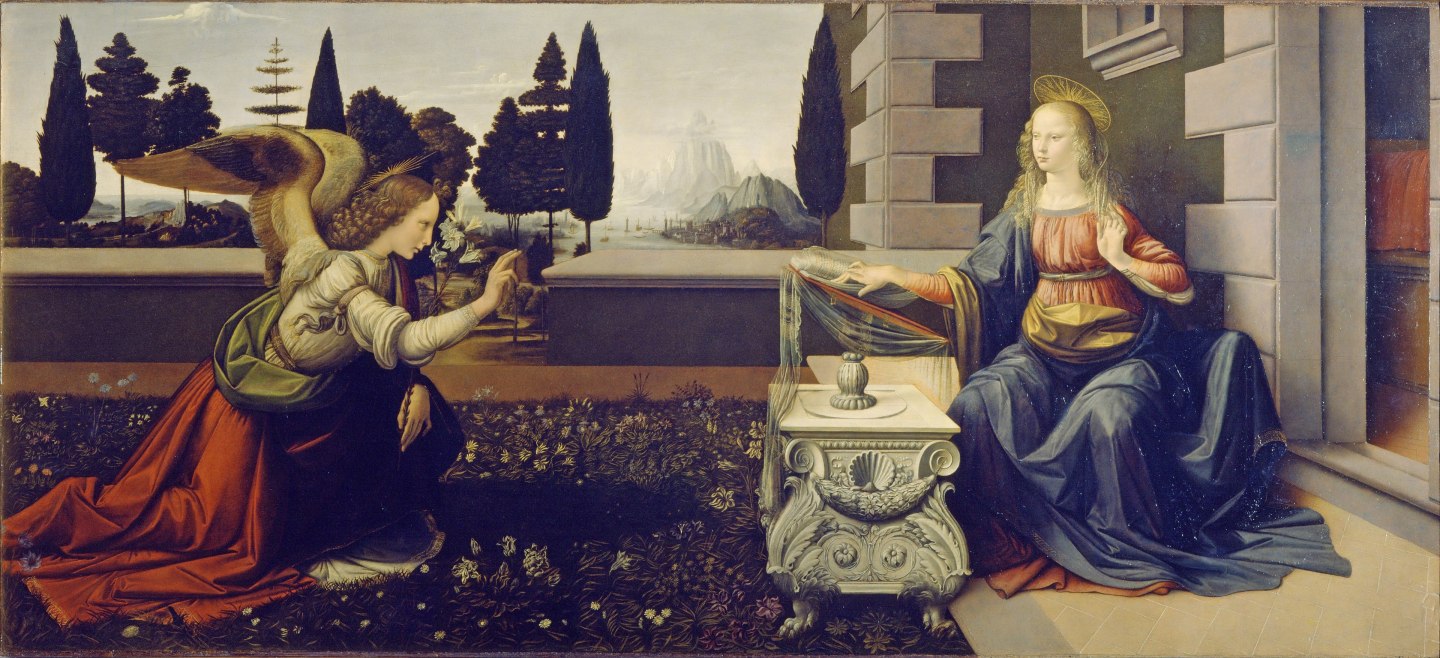‘O suver maecht van Israel’ is een 16e-eeuws Utrechts kerstlied, tegenwoordig vooral bekend geworden door de uitvoering van Herman van Veen met Ton Koopman. Het lied vertelt het kerstverhaal vanaf de aankondiging door de engel Gabriël tot de geboorte, afgewisseld door refreinen in het (quasi-)Latijn. Ik heb het eenvoudige lied bewerkt voor koor (SATB, div.) en orgel, waarvan in de video een impressie te horen is. Zie hier een voorbeeld.
‘O purest maid of Israel’ is a 16-century Christmas carol from Utrecht, the Netherlands, which narrates the Nativity story, from Gabriel’s message to the birth in Bethlehem, interspersed with refrains in (quasi) Latin. I composed an elaborate arrangement (SATB div. and organ) of the carol, which I also translated into English, as you can see below and in the video. View an excerpt from the score.
| O suver maecht van Israel, wilt seer verbliden u om der sconer bootscap wil, die ic u brenge nu. | O purest maid of Israel, be glad and do not fear, pray hearken to the news I bring; good tidings you will hear. |
| Benedicta tu in mulieribus, valasus, valasus, ave plena gracia, tecum dominus, benedicta tu in mulieribus. (=Gezegend zijt gij onder de vrouwen, sus, sus, gegroet, gezegende, de Heer is met u, gezegend zijt gij onder vrouwen). | Benedicta tu in mulieribus, valasus, valasus, ave plena gracia, tecum dominus, benedicta tu in mulieribus. (=Blessed art thou among women, lully, lullay, hail to thee, o highly favoured one, the Lord is with thee, blessed art thou among women.) |
| Al mitter bootscap scone die denghel heeft ghedaen, hebdi van shemels trone den heilighen gheest ontfaen. | When Mary heard the tidings the angel didst foretell, the Spirit of God Almighty in her didst deign to dwell. |
| Als Joseph dat verstonde, dat Maria was bevrucht, hi peinsde in sinen ghemoede, hem waer beter ghevlucht. | With much dismay did Joseph find Mary was with child; decided he, in great despair to flee into the wild. |
| Des hem die enghel schone toesprac ende riet: ‘Joseph Davids sone, en wiltse begheven niet. | But then the glorious angel didst come to him and say: ‘Joseph, son of David, with Mary you should stay. |
| Noch en ontsiet te nemen die moeder Gods, Marien; dat van haer wort gheboren, sal ons van sonden vrien.’ | Do not refuse God’s Mother to take her for your wife; her son shall vanquish sin for all, and win eternal life.’ |
| Maria end’ Joseph mede voeren beide tsamen tot Bethlehem der stede, daer si haer herbergh namen. | So Joseph trusted Mary and forth the pair did go, from Galilee up in the north to Bethlehem below, |
| In een arme huseken al sonder wech (=muur) of doorn (=deuren), omdat si waren van haven bloet (=zonder bezit, ‘van have bloot’), moest hem also gheboren (=gebeuren). | in a lowly stable, with neither crib nor bed, the only place at journey’s end where she might lay her head. |
| Alst quam te rechter middernacht, so heeft die maecht ghebaert een kindeken van groter macht, als denghel ons verclaert. | When all was peaceful, dark and quiet, in the midst of night, the maiden bore a little child, an infant of great might. |
| Daer baerde di suverlike den here ghebendijt (=gezegend) van hemel ende aertrike: lof si haer talre tijt. | Thus did the purest maiden give birth to Christ the King, Eternal God of heaven and earth, and so her praise we sing. |
| Nu laet ons loven desen heer, die ons ghenoemt Jesus; stillen (=sussen) wi hem, hi weent so seer, ende singhen hem aldus: | And in that maiden’s labour, our God descends from high, to her child our praise we sing in words of lullaby: |
| Te Deum laudamus, valasus, valasus, swighet soete Jesus, du bist ons dominus, te Deum laudamus. (=Wij prijzen u, God, sus sus, zwijg toch, zoete Jezus, u bent onze Heer, wij prijzen u, God.) | Te Deum laudamus, valasus, valasus, hush, o sweet Lord Jesus, du bist ons dominus, te Deum laudamus. (=We praise thee, God, lully lullay) hush, o sweet Lord Jesus, (thou art our Lord, we praise thee, God.) |
Afbeelding/picture: Leonardo da Vinci, De Annunciatie / The Annunciation, ca. 1472-1475.

Wat mooi! Ik kan niet wachten op een echte uitvoering. Onthustend slot.
LikeGeliked door 1 persoon
Dankjewel, Peter! Ik ook niet, eens kijken hoe ik het uitgevoerd kan krijgen..
LikeLike
Hoor ik nou op 7:26 een citaat van Victimae paschali laudes? (ik heb ‘m vanmorgen al drie keer beluisterd)
LikeGeliked door 1 persoon
Geen bewust citaat in elk geval 🙂 Bedoel in je in de orgelpartij?
LikeLike
Ja, in de orgelpartij. Je bent visionairder dan je denkt.
LikeGeliked door 1 persoon